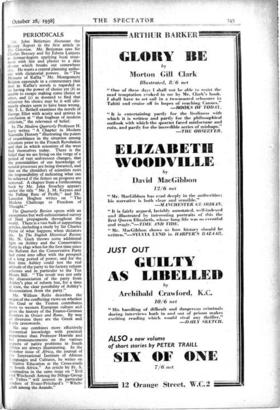PERIODICALS
Mr. John Betjeman discusses the Bressey Report in the first article, in
The Criterion. Mr. Betjeman sees. Sir
Charles Bressey and Sir Edwin Lutyens as dermatologists applying local treat- ment with lint and plaster to a skin disease which breaks out somewhere else. He wants a central planning autho- rity with dictatorial powers. In "The Measure of Kafka " Mr. Montgomery Belgion expounds in a commentary_ that man in Kafka's novels is regarded as
(a) having the power of choice yet (b) as unable to escape -making some choice or other, and (c) as doomed to find that whatever his choice may be it will ulti- mately always seem to-hive been wrong.
Mr. S. L: Bethell examines the novels of George Eliot with acuity and arrives in conclusion at " that bugbear of modern criticism," the relevance of belief.
In The Modern Quarterly Professor H. Levy writes " A Chapter in Modern
Scientific History" illustrating the points of resemblance in the situation among scientists prior to the French Revolution and thit in which scientists of the west find themselves today. There is the belief that we are livingnn the verge of a period of vast unforeseen changes; that the potentialities of our knowledge of natural processes are being thwarted, and,
that on the shoulder's of scientists rests the responsibility of indicating 'What can be achieved if the fetters on progress are
removed. A chapter from a ferthcoming book by Mr. John Strachey appears under the title " Mr. J. M. Keynes and
the Falling- Rate of Profit," and Mr. Lancelot' Hogben writes on' " The Modern Challenge to Freedom of Thonght."
The Quarterly Review opens with an anonymous but well-substantiated survey
of Nazi propaganda throughout the world. There is a vast bulk of supporting articles, including a study by Sir Charles Petrie of what happens when dictators
die. In The English Historical. Review Mr. N. Gash throws some additional
light on Ashley and the Conservative Party in 1842 when for the first time since the Reform Act the Conservative Party had come into office with the prospect of a long period of power, and for the first time Ashley could test the real attitude of the party to his factory reform schenies and in particular to the Ten Hours Bill: " The result was not only the disassociation of the party from Ashley's plan of reform but, for a time at least, the clear possibility 'of Ashley's disassociation from the party."
Mr. William Rollo deScribes the origin of the conflicting views on whether the Gaul or the Teuton contributes more to western European 'culture and gives the history of the Franco-German
frontiers in Greece and Rome. By way of diversion there are the Greek and Latin crosswords.
No one combines more effectively theoretical knowledge with practical experience than Professor Hoemle and his pronouncements bn the various aspects of "native problems in South Africa are alivays illuminating. In the
October issue of Africa, the journal of The International Institute of African
Languages and Cultures, he writes on
Native Education at the Cross-roads n South Africa." An article by Fr. S. `-;antandrea in the same issue on " Evil . .1nd Witchcraft Among the Ndogo Group ,f Tribes " will interest in particular readers of Evans-Pritchard's " Witch= craft among the Azande."
























































 Previous page
Previous page